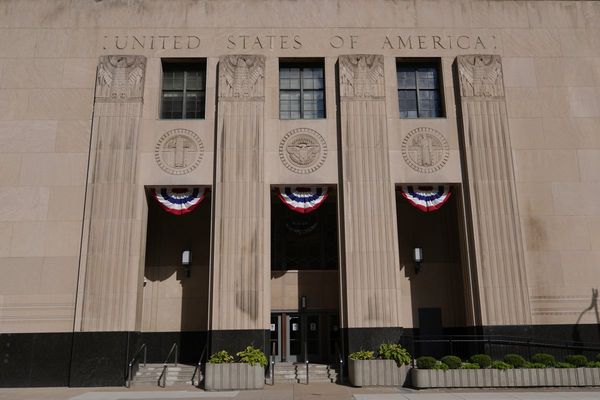
Keir Starmer has refused to rule out a post-election deal with Ed Davey’s Liberal Democrats
Keir Starmer has set hares running over a possible Liberal Democrat-Labour coalition after the next election by refusing to categorically rule out such a deal.
“Starmer’s seven evasions” is how The Times described his swerving of the question in a recent interview on Sky News. “I’m not answering hypotheticals, but we are aiming for a Labour majority,” the Labour leader said – having in the very same interview decisively ruled out any similar hypothetical arrangement with the SNP.
- SEE MORE Keir Starmer: too boring for power?
- SEE MORE Party like it’s 1997: can Tories stop a Labour landslide?
- SEE MORE Keir Starmer: preparing to be prime minister?
The notion of a post-electoral pact has arisen because not all forecasters agree that Labour will get the majority Starmer believes to be in reach. Labour needs to gain about 120 seats to even have a majority of one, the Financial Times noted.
So could a Labour-Lib Dem coalition be on the cards? And would it look anything like the 2010-15 Conservative-Lib Dem coalition?
What happened when the last coalition came together?
In 2010, a hung parliament meant that 57 Liberal Democrat MPs held the whip hand in negotiations. The Tories were the largest party with 306 MPs to Labour’s 258 and Liberal Democrat leader Nick Clegg had promised to side with the largest party.
Nick Clegg and David Cameron held a now-famous press conference in the Downing Street Rose Garden, marking the first coalition government in the country since 1945. “The bonhomie on display in the splendour of the Rose Garden ushered in a new era of coalition politics,” said Sebastian Whale in Politics Home. But it was short lived, eventually resulting in “increased partisanship and polarisation”.

Christopher Furlong
It also saw devastasting poll results for the Lib Dems in 2015, with the loss of nearly 50 MPs, an event that left them “scarred”, according to The Guardian.
What are the potential pitfalls?
“England does not love coalitions”, said Benjamin Disraeli in 1852 – a statement some Lib Dems might well sympathise with. While Cameron secured a surprise victory in 2015, the Liberal Democrats were “eviscerated”, returning just eight MPs, said Politics Home. While there are many reasons for this – the Lib Dems’ disastrous climbdown on tuition fees is widely cited as one – junior partners often tend to do less well in coalitions anyway, a trend noted by The Washington Post. They can’t enact much of what they promised before an election, nor can they sufficiently distinguish themselves from their more powerful partners once in government. “What’s good for governing – consensus and compromise – is not necessarily good for subsequently attracting votes,” added the paper.
Coalitions can also be “more alien and less democratic than voters realise”, said The Economist. David Cameron became Prime Minister as a result of an “inter-party stitch-up rather than voter choice”.
Bernard Jenkin, a Tory MP, remarked that the coalition ushered in much of the unrest that would later plague the Conservatives over the divisive EU referendum. “Party loyalty broke down because a great many Conservative MPs at one stage or another felt this isn’t really a Conservative government,” he told Politics Home.
What are the benefits?
But there are also benefits in a coalition – both large and small parties have a chance to participate in government and hold important ministerial positions, with the opportunity for new ideas to be floated around the table. “Coalitions may not be strong governments in the old sense,” said Martin Kettle in The Guardian. “But they work. They get things done. They endure – especially when a prime minister or chancellor cannot dissolve parliament.” And the alternative – a weak minority government fighting for survival – is not always preferable.
On the issue of the EU referendum, Tory MP David Gauke said the Lib Dems improved the government and helped “temper” the Tory right. “It meant the Conservative Party wasn’t beholden to its right wing, which turned out to be a problem once there was a small Conservative majority,” he added.
What do the Lib Dems want?
Labour and the Lib Dems agree on many issues, such as the environment, boosting public services and undoing some of the damage caused by Brexit. The Lib Dems, staunchly pro-EU, could attempt to force Labour into agreeing to another national vote on the UK’s relationship with the 27-nation bloc in exchange for its support, reported the Daily Express.
There is also the matter of electoral reform – another big Lib Dem issue. The party would get rid of the existing first-past-the-post voting system and replace it with proportional representation, something that is “very important to the Liberal Democrats”, its leader, Ed Davey, recently told the BBC.
Meanwhile, their electoral strategy looks robust. Lib Dem strategists are targeting two key demographics, says Freddie Hayward in The New Statesman. First, the “lifelong Tories”who have always voted Conservative but who are now “so disillusioned with the government they are switching to the Lib Dems.” Then there are the “Surrey shufflers”. “They’re from London and they can’t vote Tory – that’s not what they do. But there’s no Labour Party to vote for in Surrey and Hertfordshire. So they have to vote Liberal Democrat.” It’s already proving a successful strategy. Since the 2019 general election, the party has won by-elections in Chesham and Amersham, North Shropshire, and Tiverton and Honiton.
So will it happen?
Ed Davey has ruled out co-operation with the Tories, “but in doing so he has deprived his party of influence over Labour”, remarks Finkelstein in The Times. “It is simply a fact that the politics of members of the Liberal Democrats and those of members of the Labour Party are now indistinguishable.” So similar, that in the event of a hung parliament Davey would have to let Keir Starmer become prime minister. “And he wouldn’t be able to extract any concessions in return.”
Meanwhile, the Tories will be hoping that talk of a coalition will strengthen their hands by raising the spectre of “a coalition of chaos”. A Starmer-Davey government is more “coalition of tedium” than coalition of chaos, one Westminster wag told Politico.







